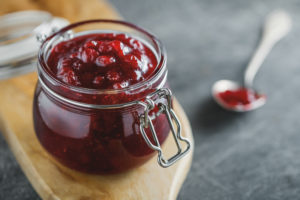Sources of Food Ingredients: Gellan Gum
Gellan Gum
- How is gellan gum made?
Gellan gum is made using bacteria found in nature. Through fermentation (like the process used to make beer and wine) cells convert nutrients into large molecules. Powder gellan gum is made by filtering and drying the fermented mixture. The resulting gellan gum can be used in very small amounts in foods and beverages.
- What does gellan gum do in my food?
Gellan gum provides a variety of benefits to foods that help make them more enjoyable and consistent while reducing waste and enhancing safety. Gellan gum is used to create gels, add texture, stabilize and suspend ingredients or nutrients, form films and create structure. These properties make gellan gum a great choice for products with innovative textures, where nutrients or ingredients must remain mixed or that are served in unique shapes.
- What kinds of foods feature gellan gum?
Gellan gum is used in dairy and non-dairy drinks, milks, nutritional products, juices, yogurts, sour creams, bakery products and fillings, fruit sauces and spreads, dairy-based desserts and flans, as well as salad dressings and sauces.
- What kind of texture does gellan gum provide?
Depending on how much gellan gum is added to a food or beverage, different consistencies and textures will result. For a dairy alternative beverage, very low levels of gellan gum create a unique suspension system that holds in soluble particles – like calcium – in suspension, ensuring you consume all of the essential nutrients added to these beverages. In bakery fillings gellan gum provides texture to keep the fillings in place during baking, transportation and consumption.
- How long has gellan gum been used in foods?
Gellan gum was first discovered by Kelco (now CP Kelco) in 1977 and was first approved for use in food in 1988. It received full food approval in the U.S Food and Drug Administration in 1992.
- Is gellan gum approved for use around the world?
Yes, gellan gum has been extensively studied, tested and proven to be safe for use in food for over 30 years. Japan first approved gellan gum for food use in 1988. Subsequently, the United States, Canada, China, Korea, the European Union as well as the World Health Organization (WHO) and many other countries have reviewed gellan gum and approved it as a safe food additive. Millions of people around the world have safely consumed gellan gum over the last three decades.
- Is gellan gum approved for use in organic foods in the U.S.?
Gellan gum is approved by the U.S. Department of Agriculture for use in organic foods. Many organic food companies have move to gellan gum because it is not made from animal products and is environmentally friendly.
- Is gellan gum vegetarian or vegan friendly?
Yes. Animal products are not used in the production process. In fact, gellan gum is often used in many of your favorite vegetarian or vegan foods and beverages. It can even replace gelatin in your some of your favorite desserts and gummies.
- Is gellan gum halal and kosher approved?
Yes, gellan gum can be approved for halal and kosher diets.
- How do I know if my food has gellan gum in it?
If gellan gum is in the food or beverage you buy, it will be listed on the label in the ingredients list. Labeling laws require disclosure of all food ingredients on packed food labels.
- Is gellan gum a sustainable product?
Yes, gellan gum is made in a controlled environment that does not require the use of farmland or pesticides.
- Why do some people criticize gellan gum?
While some online bloggers claim that food additives are dangerous or cause health issues, most of these claims do not have any scientific basis. To secure government approval for an additive to be used in food, well-developed scientific research is reviewed and scrutinized in detail by scientific experts. Gellan gum has been tested extensively and has been proven to be safe for use in foods. Online reports by bloggers who lack any scientific or medical training must be viewed with significant skepticism given the thorough research on gellan and history of safe use around the world.
- How will consuming gellan gum affect my health?
While well designed scientific research demonstrates gellan gum is safe for the general population, as with many components of food, such as lactose or gluten, some people may have individual or unique sensitivities. Before being cleared to be used in food, scientists tested gellan gum’s safety in quantities much higher than typically consumed, think pounds in one meal, rather than ounces over your lifetime, and found that it was non-toxic even at extremely high levels that would never be used in food.
- How much gellan gum is used in foods and beverages?
Gellan gum is quite efficient and a very small amount is needed – typically less than 0.1%.


